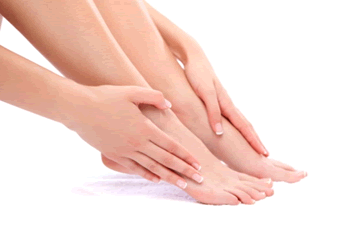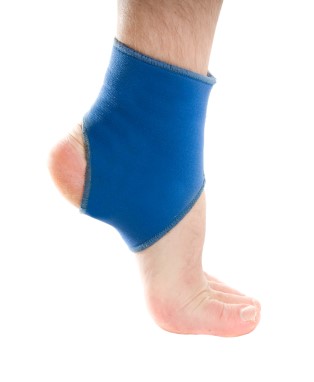June 2016
Avoid High Heels during Pregnancy
 Wearing ill-fitting shoes such as high heels during your pregnancy is not recommended, “because they fail to support the feet properly and your feet can twist,” leading to potential injury. High heels also shift the entire structure of your body and add extra strain on your feet and spine. The added weight from pregnancy also poses another risk for pregnant women who may choose to wear high heels, as their balance shifts.
Wearing ill-fitting shoes such as high heels during your pregnancy is not recommended, “because they fail to support the feet properly and your feet can twist,” leading to potential injury. High heels also shift the entire structure of your body and add extra strain on your feet and spine. The added weight from pregnancy also poses another risk for pregnant women who may choose to wear high heels, as their balance shifts.
Pregnant women are susceptible to aching and swollen feet and should be treated with care. If you are seeking treatment, see one of our podiatrists of University Foot and Ankle Center, L.L.C. Our doctors will treat your heel pain symptoms in addition to other podiatric-related needs.
What foot problems can arise during pregnancy?
One problem that can occur is over-pronation, which occurs when the arch of the foot flattens and tends to roll inward. This can cause pain and discomfort in your heels while you’re walking or even just standing up, trying to support your baby.
Another problem is edema, or swelling in the extremities. This often affects the feet during pregnancy, but tends to occur in the later stages.
How can I keep my feet healthy during pregnancy?
- Wearing orthotics can provide extra support for the feet and help distribute weight evenly
- Minimize the amount of time spent walking barefoot
- Wear shoes with good arch support
- Wear shoes that allow for good circulation to the feet
- Elevate feet if you experience swelling
- Massage your feet
- Get regular, light exercise, such as walking, to promote blood circulation to the feet
If you have any questions please feel free to contact our offices located in East Brunswick and Monroe Township, NJ. We offer the newest diagnostic tools and technology to treat your foot and ankle needs.
Sammy Watkins Undergoes Surgery to Correct Broken Foot
 Sammy Watkins of the Buffalo Bills had surgery for a broken bone in his foot in April. He had a screw inserted during the surgery. Watkins “averaged 100 yards per game with seven touchdowns his final nine contests.” Watkins was recovering and doing rehab during the OTA, and had posted on Twitter about his operation. “To all my fans I’m doing great, can’t believe everything you hear. Thanks for checking on me gotta love you guys. #BUFFLOVE,” he had posted. Watkins was hopeful that he would be ready by preseason.
Sammy Watkins of the Buffalo Bills had surgery for a broken bone in his foot in April. He had a screw inserted during the surgery. Watkins “averaged 100 yards per game with seven touchdowns his final nine contests.” Watkins was recovering and doing rehab during the OTA, and had posted on Twitter about his operation. “To all my fans I’m doing great, can’t believe everything you hear. Thanks for checking on me gotta love you guys. #BUFFLOVE,” he had posted. Watkins was hopeful that he would be ready by preseason.
Foot surgery is sometimes necessary to fix a foot ailment. To learn more, consult with one of our podiatrists of University Foot and Ankle Center, L.L.C. Our doctors will attend to all of your podiatric needs.
When Is Surgery Necessary?
Foot and ankle surgery is generally reserved for cases in which less invasive, conservative procedures have failed to help with the problem. Some of the cases in which surgery may be necessary are:
- Removing foot deformities like bone spurs and bunions
- Severe arthritis that has caused bone issues
- Cosmetic reconstruction
What Types of Surgery Are There?
The type of surgery you receive will depend on the nature of the problem you have. Some of the possible surgeries include:
- Bunionectomy for painful bunions
- Surgical fusion for realignment of bones
- Neuropathy decompression surgery to treat nerve damage
Benefits of Surgery
Although surgery is usually a last resort, it can provide more complete pain relief compared to non-surgical methods and may allow you to finally resume full activity.
Surgical techniques have also become increasingly sophisticated. Techniques like endoscopic surgery allow for smaller incisions and faster recovery times.
If you have any questions please feel free to contact our offices located in East Brunswick and Monroe Township, NJ. We offer the newest diagnostic tools and technology to treat your foot and ankle needs.
Getting Rid of Foot Odor
 If you have stinky feet, that means it’s time to start investing in a foot care regime, as your feet are suffering from a combination of sweat and bacteria. Make sure to wash your feet thoroughly, including in between the toes. A pumice stone is ideal for helping to remove any dirt or dead skin. Properly dry your feet, as moisture “can lead to the growth of fungus and bacteria.” Trim your toenails straight across, choose comfortable shoes made from breathable leather, alternate and wash your shoes on a regular basis, and opt for cotton socks. You can also use at-home ingredients such as cornstarch or apple cider vinegar to apply to your feet to remove sweat and bacteria.
If you have stinky feet, that means it’s time to start investing in a foot care regime, as your feet are suffering from a combination of sweat and bacteria. Make sure to wash your feet thoroughly, including in between the toes. A pumice stone is ideal for helping to remove any dirt or dead skin. Properly dry your feet, as moisture “can lead to the growth of fungus and bacteria.” Trim your toenails straight across, choose comfortable shoes made from breathable leather, alternate and wash your shoes on a regular basis, and opt for cotton socks. You can also use at-home ingredients such as cornstarch or apple cider vinegar to apply to your feet to remove sweat and bacteria.
Every day foot care is very important, especially for those that are lacking the proper foot care resources. For more information about everyday foot care, consult with one of our podiatrists of University Foot and Ankle Center, L.L.C. Our doctors will attend to all of your podiatric needs.
Every Day Foot Care
Often, people take care of their bodies, face and hair more so than they do for their feet. But the feet are a very important aspect of our bodies, and one that we should pay more attention to. After all, without our feet, we would not be able to perform most daily tasks. It is best to check your feet regularly to make sure there are no new bruises or cuts that you may not have noticed before, for example.
For dry feet, moisturizer can easily be a remedy and can be applied as often as necessary to the affected areas. Wearing shoes that fit well can also help you maintain good foot health, as well as making it easier to walk and do daily activities without the stress or pain of ill-fitting shoes, high heels, or even flip flops.
Also, wearing clean socks with closed shoes is important to ensure that sweat and bacteria do not accumulate within the shoe. Clean socks help to prevent athlete’s foot, fungi problems, bad odors, and can absorb sweat.
If you have any questions please feel free to contact our offices located in East Brunswick and Monroe Township, NJ. We offer the newest diagnostic tools and technology to treat your foot and ankle needs.
Read more about Everyday Foot Care
Kris Bryant Suffers Ankle Sprain After Running Bases
 Kris Bryant, third baseman for the Chicago Cubs, suffered a mild ankle sprain in late April. Although the 24 year old did not make the disabled list, he had an MRI done on the ankle, which indicated that the injury was not severe. Bryant sustained the injury while running from first base to home base. He was able to play one more inning, then had to be replaced by Javier Baez.
Kris Bryant, third baseman for the Chicago Cubs, suffered a mild ankle sprain in late April. Although the 24 year old did not make the disabled list, he had an MRI done on the ankle, which indicated that the injury was not severe. Bryant sustained the injury while running from first base to home base. He was able to play one more inning, then had to be replaced by Javier Baez.
Ankle sprains are common, but need immediate attention.If you have any concerns about your feet or ankles, consult with one of our podiatrists of University Foot and Ankle Center, L.L.C. Our doctors will attend to all of your podiatric needs.
How Does an Ankle Sprain Occur?
Ankle sprains take place when the ligaments in your ankle are torn or stretched beyond their limits. There are multiple ways that the ankle can become injured, including twisting or rolling over onto your ankle, putting undue stress on it, or causing trauma to the ankle itself.
What are the Symptoms?
- Mild to moderate bruising
- Limited mobility
- Swelling
- Discoloration of the skin (depending on severity)
Preventing a Sprain
- Wearing appropriate shoes for the occasion
- Stretching before exercises and sports
- Knowing your limits can aid in prevention
Treatment of a Sprain
Treatment of a sprain depends on the severity. Many times, people are told to rest and remain off their feet completely, while others are given an air cast. If the sprain is very severe, surgery may be required.
If you have suffered an ankle sprain previously, you may want to consider additional support such as a brace and regular exercises to strengthen the ankle.
If you have any questions please feel free to contact our offices located in East Brunswick and Monroe Township, NJ. We offer the newest diagnostic tools and technology to treat your foot and ankle needs.
Blog Archives
- April 2024
- March 2024
- February 2024
- January 2024
- December 2023
- November 2023
- October 2023
- September 2023
- August 2023
- July 2023
- June 2023
- May 2023
- April 2023
- March 2023
- February 2023
- January 2023
- December 2022
- November 2022
- October 2022
- September 2022
- August 2022
- July 2022
- June 2022
- May 2022
- April 2022
- March 2022
- February 2022
- January 2022
- December 2021
- November 2021
- October 2021
- September 2021
- August 2021
- July 2021
- June 2021
- May 2021
- April 2021
- March 2021
- February 2021
- January 2021
- December 2020
- November 2020
- October 2020
- September 2020
- August 2020
- July 2020
- June 2020
- May 2020
- April 2020
- March 2020
- February 2020
- January 2020
- December 2019
- November 2019
- October 2019
- September 2019
- August 2019
- July 2019
- June 2019
- May 2019
- April 2019
- March 2019
- February 2019
- January 2019
- December 2018
- November 2018
- October 2018
- September 2018
- August 2018
- July 2018
- June 2018
- May 2018
- April 2018
- March 2018
- February 2018
- January 2018
- December 2017
- November 2017
- October 2017
- September 2017
- August 2017
- July 2017
- June 2017
- May 2017
- April 2017
- March 2017
- February 2017
- January 2017
- December 2016
- November 2016
- October 2016
- September 2016
- August 2016
- July 2016
- June 2016
- May 2016
- April 2016
- March 2016
- February 2016
- January 2016
- December 2015
- November 2015
- October 2015
- September 2015
- August 2015
- July 2015
- June 2015
- May 2015
- April 2015
- March 2015
- February 2015
- January 2015
- December 2014
- November 2014
- October 2014
- September 2014
- August 2014
- July 2014




